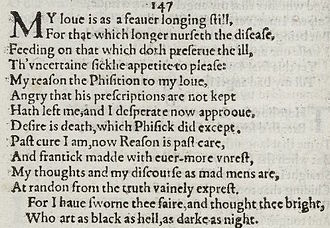Sonnet 147
Q1
Q2
Q3
C
My love is as a fever, longing still
For that which longer nurseth the disease;
Feeding on that which doth preserve the ill,
The uncertain sickly appetite to please.
My reason, the physician to my love,
Angry that his prescriptions are not kept,
Hath left me, and I desperate now approve
Desire is death, which physic did except.
Past cure I am, now reason is past care,
And frantic-mad with evermore unrest;
My thoughts and my discourse as madmen’s are,
At random from the truth vainly express’d;
For I have sworn thee fair, and thought thee bright,
Who art as black as hell, as dark as night.
4
8
12
14
Sonnet 147 is one of 154 sonnets written by English playwright and poet William Shakespeare. Sonnet 147 is written from the perspective of a poet who regards the love he holds for his mistress and lover as a sickness, and more specifically, as a fever. The sonnet details the internal battle the poet has between his reason (or head) and the love he has for his mistress (his heart). As he realizes his love is detrimental to his health and stability, perhaps even fatal, the poet's rationality attempts to put an end to the relationship. Eventually, however, the battle between the poet's reason and his love comes to an end. Unable to give up his lover, the poet gives up rationale and his love becomes all consuming, sending him to the brink of madness.
Sonnet 147 is an English or Shakespearean sonnet. The English sonnet has three quatrains, followed by a final rhyming couplet. It follows the typical rhyme scheme of the form abab cdcd efef gg and is composed in iambic pentameter, a type of poetic metre based on five pairs of metrically weak/strong syllabic positions. The 8th line exemplifies a regular iambic pentameter:
Line 3 begins with a common metrical variant, an initial reversal:
An initial reversal also occurs in line 6, and a mid-line reversal occurs in line 12. The 9th line exhibits a rightward movement of the fourth ictus (resulting in a four-position figure, × × / /, sometimes referred to as a minor ionic):
The meter demands a few variant pronunciations: line 4's "the uncertain" functions as three syllables ("th'uncertain"), line 7's "desperate" as two; and line 11's "discourse" (although a noun) is stressed on the second syllable.
...
Wikipedia

